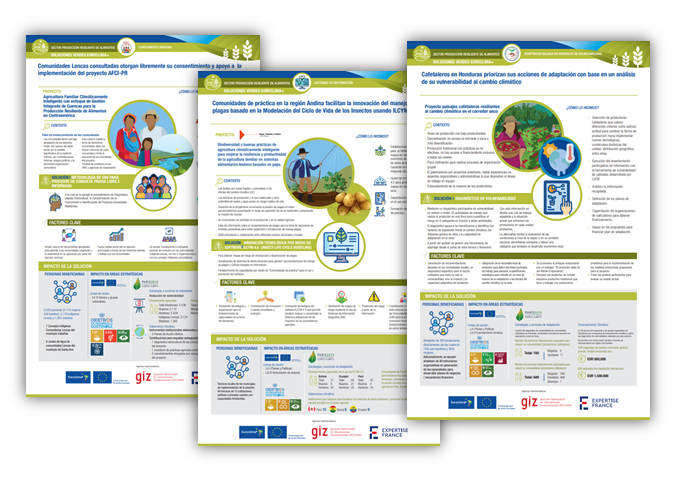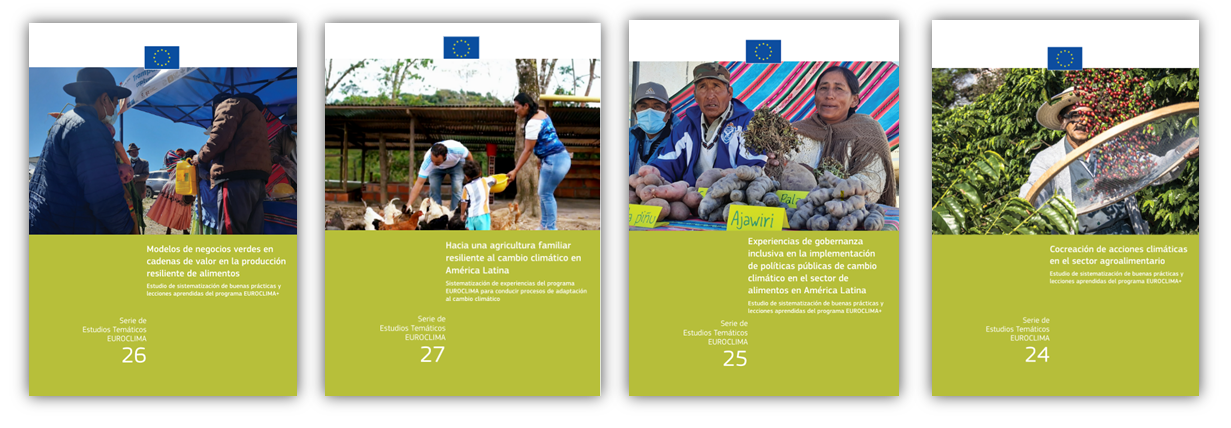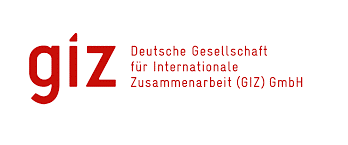EUROCLIMA+ Programme – Resilient Food Production Component
Objective
-
€1.9mBUDGET
-
01/05/2017PROJECT START
-
44 monthsDURATION
In Latin America, the poverty and extreme poverty rates in rural areas are between 1.8 and 2.6 times higher than in urban areas. In 2020 and 2021, Latin America’s agriculture sector had to cope with extreme weather events, in addition to the Covid-19 pandemic, in particular severe droughts in South America and intense and frequent hurricanes in the Caribbean and Central America. 2020 was one of the three hottest years on record in Mexico, Central America and the Caribbean and the second hottest year in South America (CEPAL, 2022).
Between 2020 and 2050, migration could double in the region due to climate change and its effects on the livelihoods of rural communities. At the same time, agriculture and livestock farming contribute considerably to these climate disruptions: they account for between a quarter and a third of greenhouse gas emissions in the region.
Strengthening the resilience of Latin America’s agri-food sector to the effects of climate change
Under the EUROCLIMA+ programme, the Resilient Food Production sectoral component aimed to strengthen the capacities of key stakeholders in the agri-food sector in order to make them more resilient to climate change. It also aimed to promote a more efficient use of water and carbon in agricultural systems and agri-food sectors.
It was jointly implemented by GIZ and Expertise France between 2017 and 2022:
• GIZ coordinated the implementation of 10 bilateral or multilateral projects benefiting 11 countries, between 2019 and 2022
• Expertise France implemented sectoral technical assistance for a total amount of €1.9 million, focusing on strengthening the capacities of key stakeholders in Latin America’s agri-food sector in order to increase the climate resilience of sectors.
Improving knowledge of climate commitments and the capacity to implement them
The objective of the technical assistance provided by Expertise France was to strengthen the capacities of key stakeholders in resilient food production (RFP) in Latin American countries in order to increase the climate resilience of agri-food sectors, focusing on the sectoral commitments of the Nationally Determined Contributions (NDCs).
Five strategic lines of action guided the technical assistance:
1. Capacity building for project management for the ten RFP project owners and their partners.
2. Promotion of intersectoral synergies, in particular with the thematic sectors “Forests” and “Risk and Disaster Reduction” of the EUROCLIMA+ Programme.
3. Capacity building for climate governance for key stakeholders in the agri-food sector.
4. Capacity building for the communication, dissemination and management of knowledge in the agri-food sector.
5. Support for specific requests.
Activities based on peer-to-peer exchanges, analysis and capitalisation
The technical assistance has been implemented using a methodological approach based on peer-to-peer exchanges and the analysis and capitalisation of knowledge and good practices. The activities included:
• Exchanges of experiences and good practices: a series of 14 thematic webinars gathering over 650 people, communities of practice and 3 regional workshops have been devised to promote exchanges of experience between the projects in the various countries.
• Strengthening knowledge about climate commitments: 41 focal points (multipliers) have been trained in the fundamentals of the Paris Agreement via distance learning in Spanish designed to ensure that the participants learn to adapt and replicate the training for other publics. The training is currently available on the e-learning platform of the Inter-American Institute for Cooperation on Agriculture (IICA).
• Learning-by-doing: the learners from the online courses and diplomas applied the knowledge and techniques learned in their working environment. Over 90 specialists in the RFP sector have strengthened their skills and knowledge on issues such as:
- The integration of climate change adaptation measures in local development planning,
- Access to climate finance in the RFP sector,
- The use of virtual solutions in the design of distance learning or negotiation in the RFP sector.
• The distribution of documentation: the lessons learned from the project have resulted in various publications based on the solutions identified by the projects.
• The use of existing dissemination networks and channels specific to the agriculture sector in Latin America (CATIE, IICA) or to the climate challenges (Panorama Solutions, NDC Partnership).
• The continuation of relations with the national focal points of the EUROCLIMA+ programme (mainly Ministries of the Environment) to promote the massive integration of climate-resilient agricultural practices in public policies.
A total of 1,509 people and over 150 organisations have been directly or indirectly supported by the technical assistance in the resilient food production sector via the initiatives to increase knowledge. Virtual exchanges featured prominently in the activities in order to adapt to the Covid-19 pandemic between 2020 and 2022.
Dissemination of good agricultural practices for climate change adaptation and mitigation
Knowledge management is an important aspect of the EUROCLIMA+ programme. The programme aims to exploit individual and collective knowledge by implementing mechanisms to identify, co-create, collect, exchange and apply knowledge and practices, both internally and with external recipients.
This has also been a central focus of the technical assistance. Three separate knowledge capitalisation exercises have been carried out for different publics:
• “Green solutions”: these solutions are the result of the systemisation of the outcomes, good practices and lessons learned from the projects supported by the EUROCLIMA+ programme in the “Resilient Agriculture Production” and “Forests, Biodiversity and Ecosystems” sectors. They have been selected for their potential for replicability in other contexts and their potential to contribute to the green recovery in Latin American countries. They have been disseminated in the form of infographics to inform policy-makers and partners about the green solutions identified under the programme.

Further reading: EUROCLIMA+: green solutions for Latin America
• Four short technical publications summarise the exchanges of knowledge and good practices which took place during the 14 webinars between 2020 and 2021. These publications are available in English and Spanish on the EUROCLIMA+ programme website.

• Four capitalisation studies have been carried out by the technical assistance on the following themes (publications in Spanish):
- Green economic models in the value chains of resilient food production;
- Towards climate-resilient family farming in Latin America;
- Experiences of inclusive governance in the implementation of public policies on climate change in the food sector in Latin America;
- Co-creation of climate actions in the agri-food sector.

 Consult these publications on the EUROCLIMA+ programme website
Consult these publications on the EUROCLIMA+ programme website
EUROCLIMA+: a programme for climate change adaptation and mitigation in Latin America
 EUROCLIMA+ is the European Commission’s flagship programme to support environmental sustainability and climate change mitigation and adaptation measures in Latin America.
EUROCLIMA+ is the European Commission’s flagship programme to support environmental sustainability and climate change mitigation and adaptation measures in Latin America.
Launched in 2010 under the name “EUROCLIMA”, it became “EUROCLIMA+” in 2017 following the Paris Agreement. Its aim is to strengthen national policies, the achievement of the international climate commitments, knowledge and action for decarbonisation, climate resilience, and the protection and restoration of biodiversity.
Its objective is to assist the 18 Latin American countries with the implementation of their Nationally Determined Contributions (NDCs) under the United Nations Framework Convention on Climate Change (UNFCC). To this end, it assists with the identification and implementation of innovative projects and activities in six thematic sectors (Forests, biodiversity and ecosystems; Energy, Water, Risk and disaster management; Urban mobility, Resilient food production) and six crosscutting lines of action (Public policies; Climate finance; Transparency; Intersectoral and multilevel coordination; Action for climate empowerment; Gender and vulnerable groups).
The programme is implemented by two United Nations agencies and five cooperation agencies of EU Member States, including Expertise France. Since 2017, Expertise France has been the lead agency for the “Forest, Biodiversity and Ecosystems” (FBE) sector and is implementing this technical assistance in the “Resilient Food Production” sector together with GIZ.
 To find out more about the EUROCLIMA+ programme: euroclimaplus.org
To find out more about the EUROCLIMA+ programme: euroclimaplus.org
|
Check out the programme on the social networks #EuroclimaPlusAlimentos |





